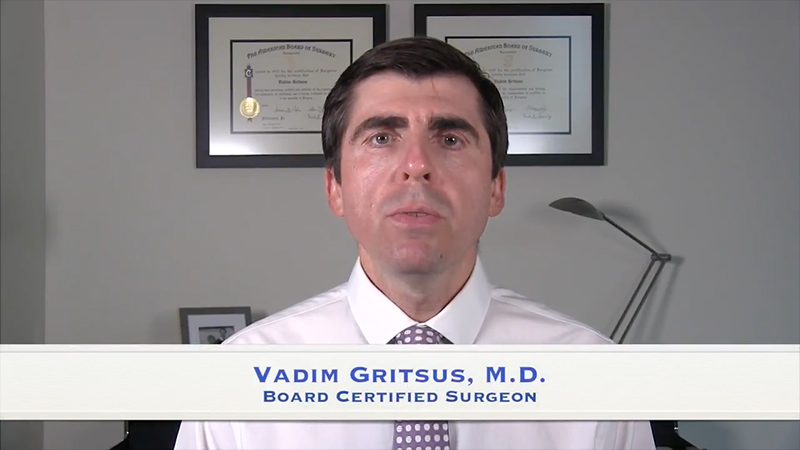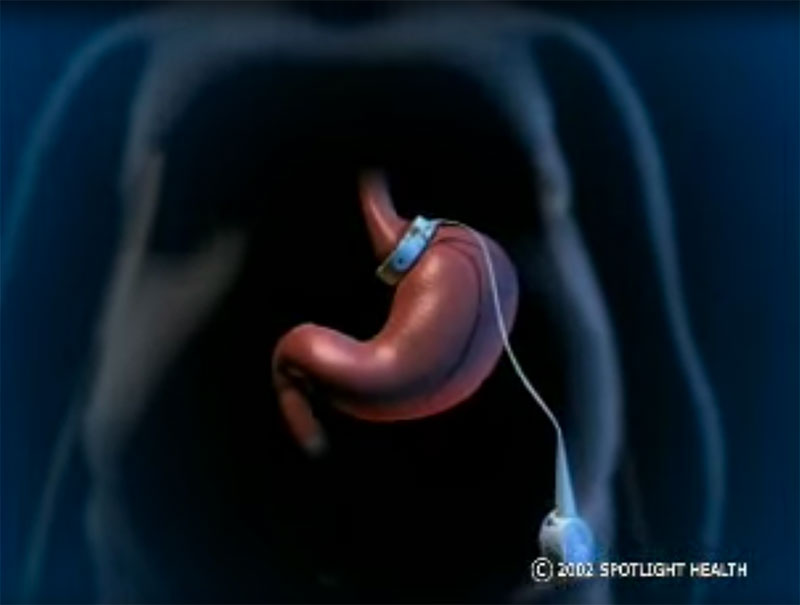According to the American Medical Association (AMA), obesity is the second leading preventable cause of death, second only to smoking. This is because obesity puts individuals at an increased risk of developing serious medical conditions such as diabetes, hypertension, cardiovascular disease and sleep apnea.
For people who struggle with obesity, a surgical option to combat weight gain is available. Laparoscopic adjustable gastric band, "Lap Band" or simply "The Band" is a device placed around the top portion of the stomach, similar to a bracelet or a zip tie.
The Lap Band separates a small pouch from the rest of the stomach and once this small pouch fills up with food, a person will feel full. The food then migrates slowly into the rest of the stomach, somewhat like sand in an hourglass. Speak to Dr. Gritsus for an effective weight loss solution and get arguably the best Lap Band NJ has to offer.
How Does the Lap Band Work?
The Lap Band is made adjustable by having an inner inflatable part that looks like a lifesaver.
The Lap Band can be inflated or deflated in the office by using a thin needle and saline. By "inflating" the band the opening between the top pouch and the rest of the stomach is made smaller and food takes longer to pass through the band.
Living with the Lap Band
The process of the treatment with the Lap Band begins with placement, which is an outpatient procedure. Afterwards, our New Jersey Lap Band patients come to our office usually once a month for 6 months to have the band "fine-tuned" by performing inflations of the band or "adjustments."
After each adjustment, the patient "test drives" the Lap Band for 3-4 weeks and then we decide if the band is tight enough or still needs more inflation. Ideally, patients should feel full with small portions, lose weight, and still be able to digest food. If the Lap Band feels too tight (patients unable to eat solids, have burping, difficulty swallowing or heartburn), it can be "deflated" by removing some of the saline from the band. The band can be left indefinitely on the stomach or it can be removed at any time, if needed or desired.
Why Choose Lap Band Surgery?
The band is a great tool and a very small surgery. It also does not alter a patient's stomach or intestine. The downside of the band is that it can be difficult for a patient to adapt to it and it requires more effort on the patient's part than other Weight Loss Surgeries.
The band can be a great tool for patients who are motivated to lose weight and want to be in control of their process. Many of our New Jersey Lap Band patients live in Northern NJ but we also have patients come from New York, Pennsylvania and beyond. The Lap Band does require follow ups with the surgeon's office more frequently than other weight loss procedures such as the Gastric Sleeve or Gastric Bypass. The reason frequent follow up is required is that Lap Band adjustments need to be performed on a regular basis in the beginning of the process. Typically, patients have monthly adjustments for several months after the procedure. So, it may be more convenient for the patient to have a local lap band surgery in New Jersey to prevent commuting expenses from stacking up.

Is Lap Band Surgery Right For Me?
While many millions of people struggle with their weight, not everyone may be the right candidate for a Lap Band New Jersey Weight Loss Surgery patients who have failed to maintain adequate weight loss through dieting and structured weight loss plans and who are very obese are best suited for the Lap Band procedure.
Generally speaking, Lap Band surgery is recommended for people living with a body mass index (BMI) of 40 or greater, or people with a BMI between 35-40 who suffer from weight-related medical problems such as diabetes, heart disease and high blood pressure. Patients who fall into either of these BMI categories are typically medically diagnosed as morbidly obese.
The disease of morbid obesity can greatly impact your health and make daily life activities like walking or even breathing very difficult. Morbid obesity also leads to long-term serious health implications, causing weight-related conditions such as diabetes and heart disease. Obesity is a serious issue, one that can lower your quality of life and is known to shorten life expectancy.
Advantages of Lap Band Surgery
The Lap Band surgery was first approved by the United States Food and Drug Administration (FDA) in 2001. In a very short time, the Lap Band has become one of the most popular surgical procedures in America. The likely reason for Lap Band surgery becoming so successful is that is minimally invasive, adjustable and reversible. Lap band surgery also does not alter a person’s intestinal anatomy, so it does not affect body functions nor impact the body’s ability to absorb needed nutrients.
Here are some of the other advantages of Lap Band surgery:
- Lap band surgery can be performed in under an hour
- No hospital stay is required after Lap Band surgery
- The Lap Band is covered by most insurance plans
- The Lap Band is completely adjustable and reversible
For female patients, a Lap Band can be adjusted if the patient gets pregnant. A Lap Band can be loosened to ensure a healthy pregnancy and re-tightened after giving birth to resume weight loss.
Another important advantage of the Lap Band is that it can be offered to our New Jersey Weight Loss Surgery patients with lower Body Mass Index (BMI) number than other weight loss surgical procedures such as the Gastric Bypass or Gastric Sleeve.
The U.S. Food and Drug Administration (FDA) currently recommends Lap Band surgery for patients with a BMI exceeding 35 without any obesity related health conditions or a BMI exceeding 30 with obesity related health issues such as diabetes, high blood pressure, sleep apnea, high cholesterol, lower back pain, among others.
Challenges of Life after Lap Band Surgery
One of the common challenges of losing weight with the Lap Band is adapting to a new eating regimen. For examples of what types of food you can eat, please refer to our Lap Band diet guidelines.
Sometimes patients experience a change in how the Lap Band feels throughout the day. This is normal. For example, the Lap Band can feel "tight" in the morning and very "loose" in the afternoon. This happens because the stomach can have more or less swelling throughout the day. It resembles wearing a ring on your finger. If your hand is swollen, the ring will feel tight.
Cost of Lap Band Surgery
The Lap Band is covered by health insurance if you qualify. The CPT code for the Lap Band is 43770.
If you do not have insurance coverage, the fee for the Lap Band includes a surgeon fee, anesthesia, facility fee and all subsequent band adjustments.
Contact Us Today
To learn more about one of the best lap band New Jersey has available, please view our informational seminar.
Schedule a Consultation Today
Call today to schedule a private consultation in New Jersey


